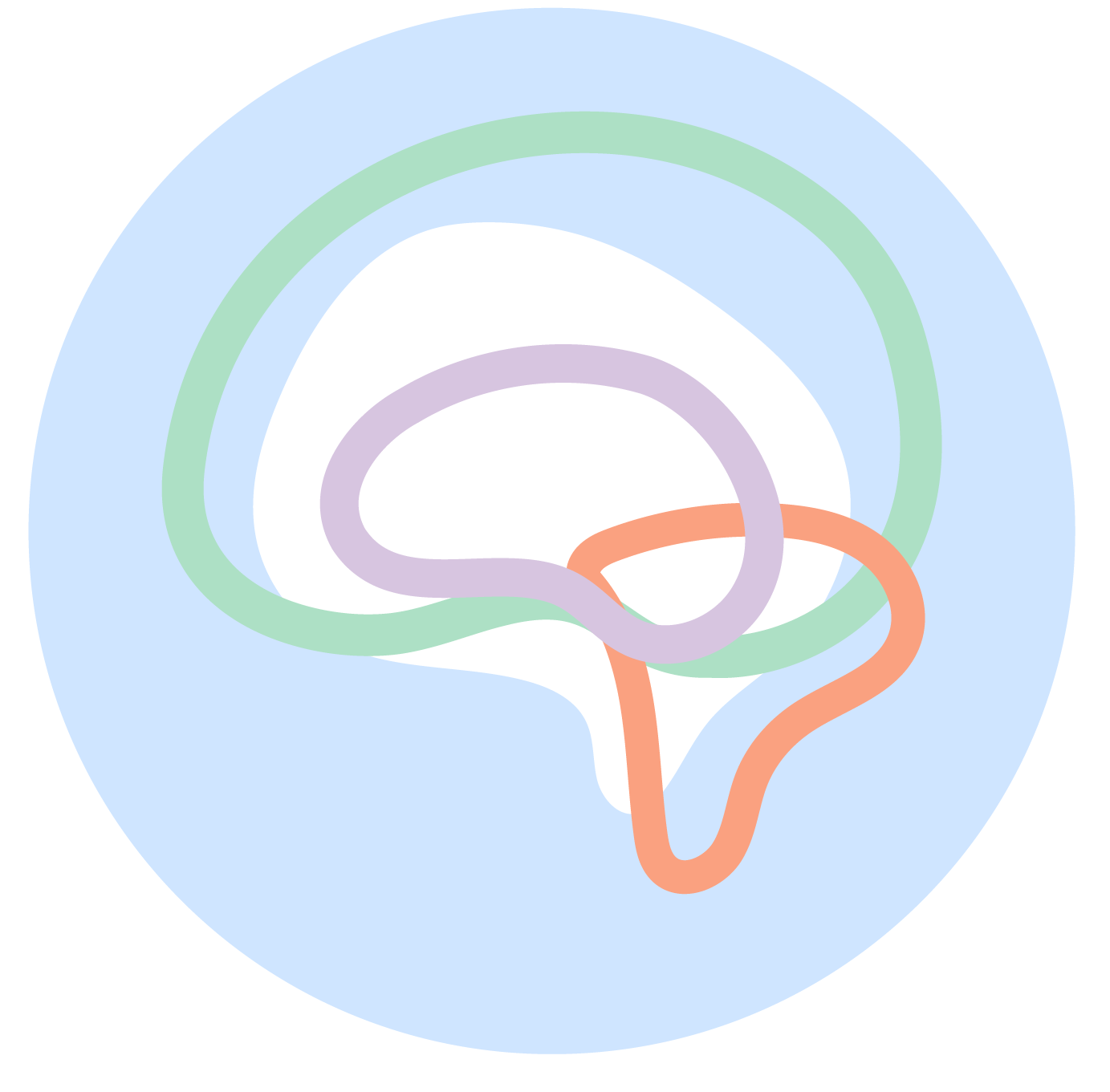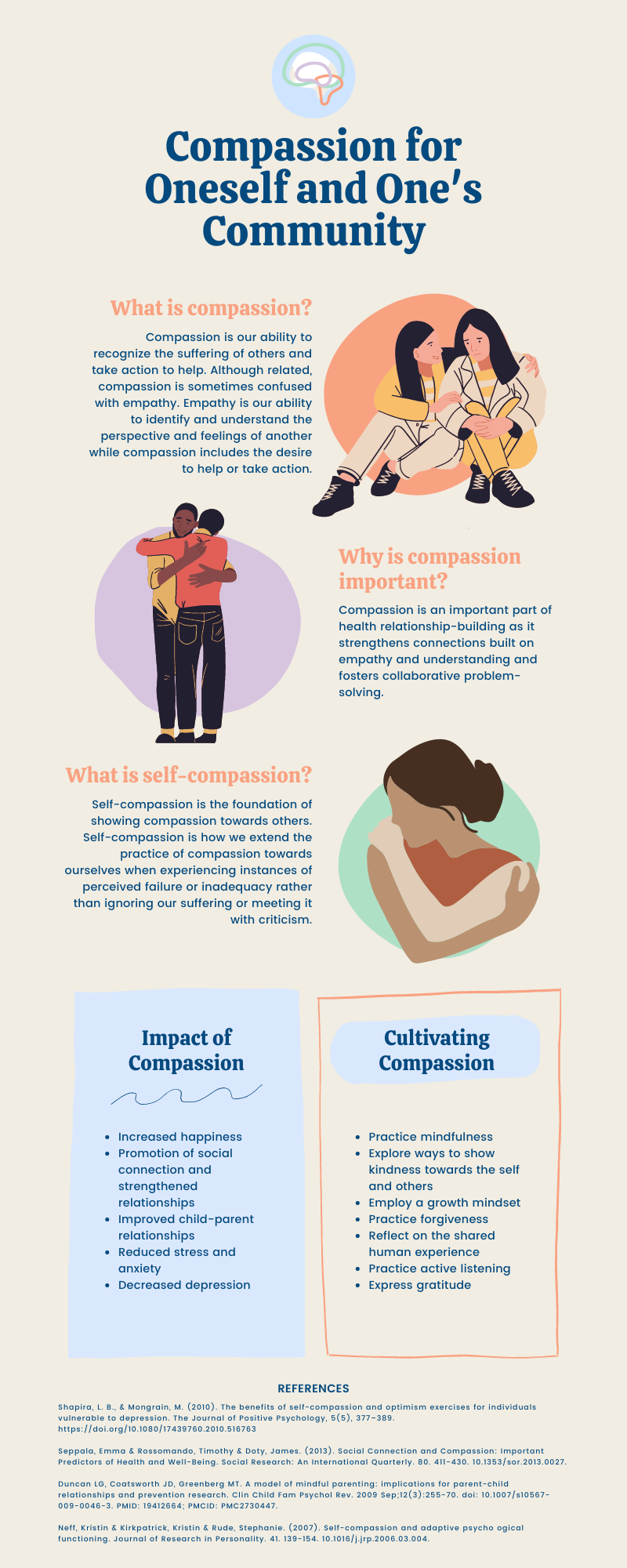Compassion for Oneself and One’s Community
What is Compassion?
The American Psychological Association (APA) defines compassion as a strong feeling of sympathy with another person’s feelings of sorrow or distress, usually involving a desire to help of comfort that person.” In other words, it is our ability to recognize the suffering of others and take action to help.
You might think compassion sounds a little like empathy – and you’d be right! Empathy and compassion are related, but they are not the same. Empathy is our ability to identify and understand the perspective and feelings of another while compassion includes the desire to help or take action.
Why is Compassion Important?
Compassion has the power to inspire change and encourage positive behaviors that benefit us as individuals and as a collective society. Studies have found:
Increased compassion can lead to increased happiness and decreased depression (Shapira & Mongrain, 2010)
Compassion promotes social connection (Seppala et al., 2013)
Increased compassion can lead to improved parent-child relationships (Duncan et al., 2009)
Compassion is an important part of health relationship-building as it strengthens connections built on empathy and understanding and fosters collaborative problem-solving. But in order for us to build these relationships and show compassion towards others, we must first practice compassion for ourselves.
Self-compassion is how we extend the practice of compassion towards ourselves when experiencing instances of perceived failure or inadequacy rather than ignoring our suffering or meeting it with criticism. Dr. Kisten Neff, a leading expert in self-compassion, notes that it consists of three core components: mindfulness, self-kindness, and common humanity. She is quoted saying that through the practice of self-compassion we “become an inner ally instead of an inner enemy.”
And it makes a difference! Studies have found that self-compassion plays a significant role in overall health and well-being by buffering the impact of stress (Allen & Learly, 2010) and anxiety (Neff et al., 2007). Self-compassion helps us to restructure the way we think about and respond to adversity and equips us to better support others in doing the same.
Cultivating Compassion
Compassion is something we can cultivate (or grow) and can practice towards ourselves, others, and our community.
Compassion for Oneself
Practice forgiveness. Mistakes are a part of life and everyone makes them. They can help us to see new opportunities and learn about ourselves. Practice seeing yourself as a whole - flaws and all and reframe mistakes as an opportunity to grow. Utilize positive affirmations to practice self-kindness.
Practice mindfulness. Mindfulness helps us to take inventory of how we are feeling and how we are perceiving the world around us. Reflect on how your feel - emotionally and physically. Take note of big emotions or feelings of discomfort and allow them to be present without judgment before letting them go.
Express gratitude. Reflecting on the things or people we are grateful for helps us employ a growth mindset and move away from perceived shortcomings. Start or end each day with a list of three things you were most grateful for and reflect on changes in how you feel over time.
Compassion for Others & Community
Practice active listening. Active listening helps to ensure that everyone feels seen and heard. Be mindful of body language, avoid distractions, reflect back feelings expressed, and stay engaged by asking questions.
Put yourself in someone else’s shoes. Practice seeing the perspective of others. Remove any judgments and reflect on their experience or point of view. Try to imagine what feelings or emotions might come up and reflect on how you might be able to play a role in helping.
Separate the person from the behavior. It’s important to remember that how a person behaves does not make them a good or bad person. Our bodies respond to adversity in different ways based on our own unique lived experiences. Separating the person from the behavior changes the question from what is wrong with you to what has happened to you - allowing us to take a different perspective and respond in a compassionate way.
Resources
Check out these resources from Positive Psychology for practicing compassion for adults and children.
Compassion for Oneself and One’s Community: Infographic



